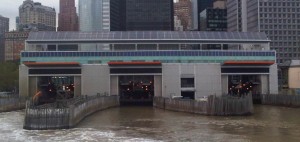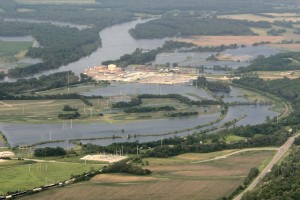
Copyright, L. J. Furman, 2011, All Rights Reserved.
 Tweet In Part 1, I criticized “How to Really Save the Economy“, an op-ed in the New York Times, published Sept. 10, 2011. So how do we really save the economy?
Tweet In Part 1, I criticized “How to Really Save the Economy“, an op-ed in the New York Times, published Sept. 10, 2011. So how do we really save the economy?
“One of the best kept secrets in New York City,” I wrote, “is the existence of a 40 kilowatt (KW) photovoltaic solar array on the Whitehall Street terminal of the Staten Island Ferry,” pictured above, and first covered in Popular Logistics in 2007, here.
There are 90,000 public schools in the United States. Suppose we were to install a 40 KW solar energy system on each of them. PV solar modules require very little maintenance over their 35 to 45 year life expectancy. My initial thought was $5 per watt or $5,000 per kilowatt, but $4,000 per kilowatt is more realistic for the near term price of solar, particularly at the utility scale. This is where we expect the cost of solar in the Q4 2012 timeframe, without subsidies.
At $4,000 per KW of nameplate capacity, each of these 90,000 systems would cost $160,000. This 3.6 gigawatts of distributed daylight-only capacity would cost about $14.4 billion.
 It seems to make sense to use taxpayer monies to finance these systems; taxpayers pay the electric bills for public schools and other public infrastructure, so rather than pay a utility to burn coal, oil, or gas, or harness nuclear fission, we could buy solar modules, put them on the roof and transform sunlight into electricity. But what are the other implications? What would it give us? And what do we do at night? How much juice do we get?
It seems to make sense to use taxpayer monies to finance these systems; taxpayers pay the electric bills for public schools and other public infrastructure, so rather than pay a utility to burn coal, oil, or gas, or harness nuclear fission, we could buy solar modules, put them on the roof and transform sunlight into electricity. But what are the other implications? What would it give us? And what do we do at night? How much juice do we get?
The US Dept. of Energy’s (DOE) National Renewable Energy Lab’s (NREL) PV Watts solar energy calculator tells you the power you can expect from a given solar system anywhere in the US. Regarding night-time; solar is effective in conjunction with other sources of energy, and other clean, renewable, sustainable sources include wind, geothermal, micro-hydro, biofuel.
Every public school in the country would have a power plant that generates power, during the day, with no fuel cost and no waste., and no associated mining, processing, transportation, fuel costs and no waste management costs. At $5.00 per watt, or $5 billion per gigawatt, the capital costs are lower than the costs of new nuclear and significantly lower than the costs of coal with carbon sequestration, with none of the risks or hazards associated with the systems: no arsenic, mercury, lead, thorium, uranium, zinc, or carbon.
The systems would be tied to the electric grid, after all, while most of their operations are during the day, schools need power at night. If these systems could be disconnected from the electric grid, then we would have 90,000 structures distributed all over the United States, with power during the day in the event of power outages from storms, earthquakes, accidents, etc. Even if we lost 10% of them in a disaster like Katrina, or an event like Irene or the recent earthquake, we would still have 81,000 all over the country. Coupled with efficient refrigeration systems, we would have shelters with power to keep food and medications cold during emergencies; and these would be distributed across the country.
The solar systems would obviously have to be installed here, which would stimulate the economy, and we could even require the components to be manufactured here, further stimulating the economy.
Why not business as usual?
 As reported here the North Anna nuclear plants in Virginia were shut down during the earthquake a few days before hurricane Irene. The Dominion plants in Virginia, and the Oyster Creek plant in New Jersey were shut down and the Millstone 2 & 3 plants in Connecticut and the Brunswick plants in North Carolina were brought to reduced capacity during Irene, and the Fort Calhoun plant in Nebraska has been shut down due to flooding, and losing $1 million per day, since June 6, 2011.
As reported here the North Anna nuclear plants in Virginia were shut down during the earthquake a few days before hurricane Irene. The Dominion plants in Virginia, and the Oyster Creek plant in New Jersey were shut down and the Millstone 2 & 3 plants in Connecticut and the Brunswick plants in North Carolina were brought to reduced capacity during Irene, and the Fort Calhoun plant in Nebraska has been shut down due to flooding, and losing $1 million per day, since June 6, 2011.
In Part 1, I criticized “How to Really Save the Economy, “an op-ed in the New York Times, published Sept. 10, 2011. “The United States,” according to Robert Barro, who teaches economics at Harvard and is a “fellow” at the Hoover Institution, “is in the third year of a grand experiment by the Obama administration.”
“This is inaccurate,” I wrote, Obama is the President, but the US Constitution provides a framework in which power is divided into three branches of the Federal government, and the power of the each of the branches is checked and balanced by the others, and “all power not expressly granted to the federal government is held by the states and the citizens.” It would be more accurate, therefore, to say,
“The United States is in the third year of an experiment in governance between the Obama administration, the Congress, the Judiciary, the Republican Party, various special interests, and the citizens. This appears to be an experiment in governance by not-governing. Due to significant differences of opinion with regards to the direction in which to drive the ship of state, the ship of state appears to be floundering. Governance by not-governing doesn’t work!”
In parts 3 and 4 I hope to present feedback from the telecommunications and wind industries. Meanwhile, another radioactive nail in the nuclear coffin – an explosion in a low-level waste management facility in France killed one person and injured four. DC Bureau, Associated Press reports “An explosion at a nuclear waste facility in southern France killed one person and injured four on Monday. Authorities said there was no radioactive leak, but critics urged France to rethink its nuclear power in the wake of the catastrophe at Japan’s Fukushima plant.The Nuclear Safety Authority declared the accident “terminated” soon after the blast at a furnace in the Centraco site, in the southern Languedoc-Roussillon region, about 20 miles (32 kilometers) from the city of Avignon. One of the injured suffered severe burns…. the body was burned so badly it was carbonized”
 I wrote,
I wrote,










 It is clear that the emphasis on cutting government spending, eliminating government jobs, eliminating benefits to unemployed citizens, rather than raising revenues and developing infrastructure is not in the long term or short term interests of the United States. As the 512 point drop in the Dow Jones Average, and the downgrade of US debt indicate, Republicans and the Tea Party should be careful for what they wish for – they just might get it.
It is clear that the emphasis on cutting government spending, eliminating government jobs, eliminating benefits to unemployed citizens, rather than raising revenues and developing infrastructure is not in the long term or short term interests of the United States. As the 512 point drop in the Dow Jones Average, and the downgrade of US debt indicate, Republicans and the Tea Party should be careful for what they wish for – they just might get it.




